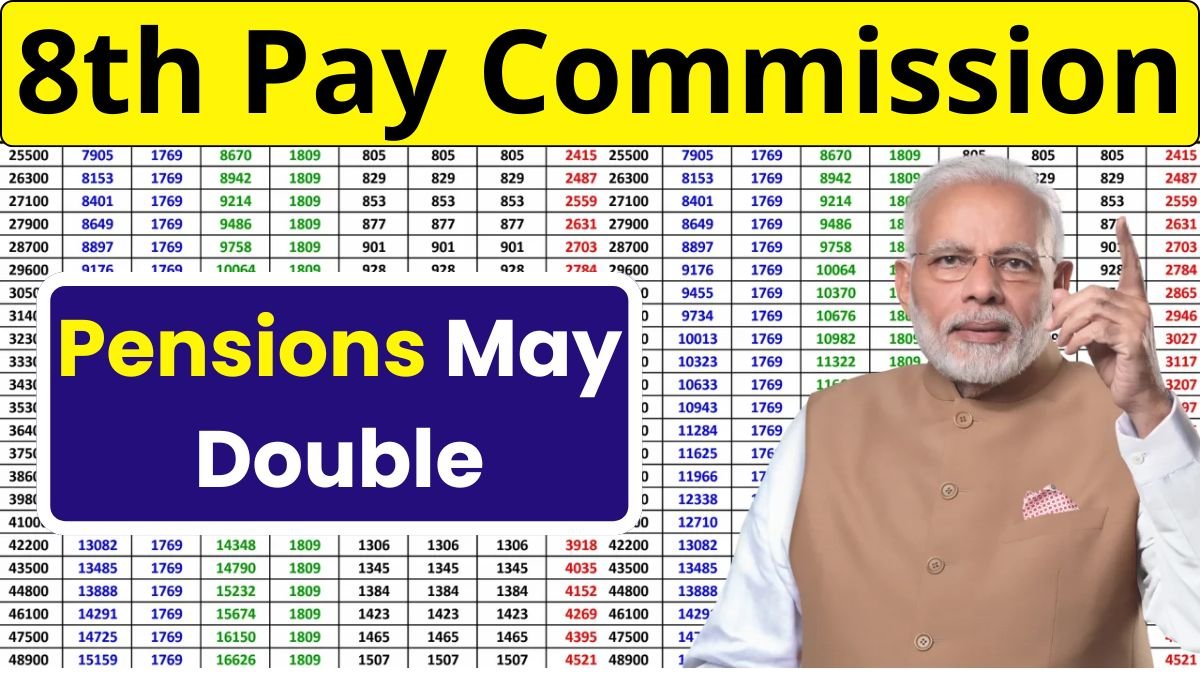Have you ever wondered what changes the 8th Pay Commission might bring for central government employees? Well, it’s finally official — the government has announced the names of the remaining members of the commission and shared its working plan. And here’s where things get interesting: some allowances may be scrapped, and pensions could nearly double for millions of retirees.
What Exactly Has the Government Announced?
On Tuesday, the Central Government released a new notification confirming the full formation of the Eighth Pay Commission (8th CPC). The aim this time isn’t just to revise pay scales — it’s to create a system that rewards performance, accountability, and responsibility rather than just seniority.
The commission will study and recommend changes to:
- Salaries
- Allowances
- Bonuses
- Pensions
- Gratuity and related facilities
Simply put, this isn’t just another pay revision — it’s an attempt to modernize how government pay works.
Who’s Leading the 8th Pay Commission?
According to the notification, the 8th Pay Commission will be chaired by Justice Ranjana Prakash Desai, a respected name in Indian judicial circles.
Other key members include:
- Professor Pulak Ghosh, as part-time member
- Pankaj Jain, as member secretary
The commission’s headquarters will be in New Delhi, and it has been given 18 months to submit its report to the government. That means recommendations could realistically come by mid-2026 if all goes as planned.
The panel can also consult experts, economists, and institutions to ensure the new pay structure is practical and future-ready.
What’s the Big Goal of the 8th Pay Commission?
Here’s the thing — earlier pay commissions focused mostly on inflation and parity. This time, the government wants to connect pay hikes to performance.
Think of it this way: just like in the private sector, the idea is to make sure better performance means better pay. The emphasis is on:
- Accountability
- Measurable outcomes
- Simplifying the salary structure
In short, the government wants to reward efficiency and ensure that employees feel motivated to deliver their best.
Could Pensions Really Double?
Now, this is the part everyone’s talking about.
If the fitment factor (the number used to calculate salary and pension revisions) is increased in line with past trends, pensions could see a significant jump.
For example, a ₹25,000 monthly pension could rise to ₹50,000. That’s not an official figure yet, but experts believe such an increase is highly possible if the 8th CPC follows the same pattern as the 7th Pay Commission.
Review of Bonuses and Allowances
The 8th Pay Commission will also take a close look at the existing bonus and allowance structure. The aim? To weed out outdated or unnecessary allowances and make the overall system simpler and fairer.
Some of the key areas under review include:
- Bonus schemes: To determine which ones are still relevant.
- Death-cum-Retirement Gratuity (DCRG): Especially for employees under the National Pension System (NPS).
- Pension and Gratuity Rules: For those who are still under the old pension scheme (OPS).
So yes, whether you’re in NPS or OPS, the changes could affect you differently.
Which Allowances Might Be Abolished?
While the government hasn’t officially released a list, several reports suggest that certain allowances may be discontinued. These include:
- Travel Allowance (TA)
- Special Duty Allowance
- Minor Regional Allowances
- Departmental or Clerical Allowances (like typing allowance)
The logic behind this move is simple — too many overlapping allowances make the salary structure complicated. By removing or merging smaller ones, the government hopes to create a cleaner, more transparent pay framework.
What Should Employees Expect Next?
If past commissions are any indication, the implementation of the 8th CPC could lead to a significant hike in take-home pay and pensions. However, since performance-based criteria are being introduced, employees may have to adapt to new evaluation systems.
For now, the best approach is to stay informed and plan finances smartly. Once the 8th Pay Commission submits its report, we’ll know exactly how the changes affect different employee groups.
Frequently Asked Questions
1. When will the 8th Pay Commission submit its report?
The 8th Pay Commission has been given 18 months to complete its work, so the final report is expected around mid-2026.
2. Will pensions really double under the 8th Pay Commission?
While not confirmed, experts predict a significant increase if the fitment factor rises as expected. A pension of ₹25,000 could go up to about ₹50,000.
3. Which allowances might be removed?
Some of the likely allowances to be scrapped include travel, special duty, and minor regional allowances. The goal is to simplify and modernize the pay system.
